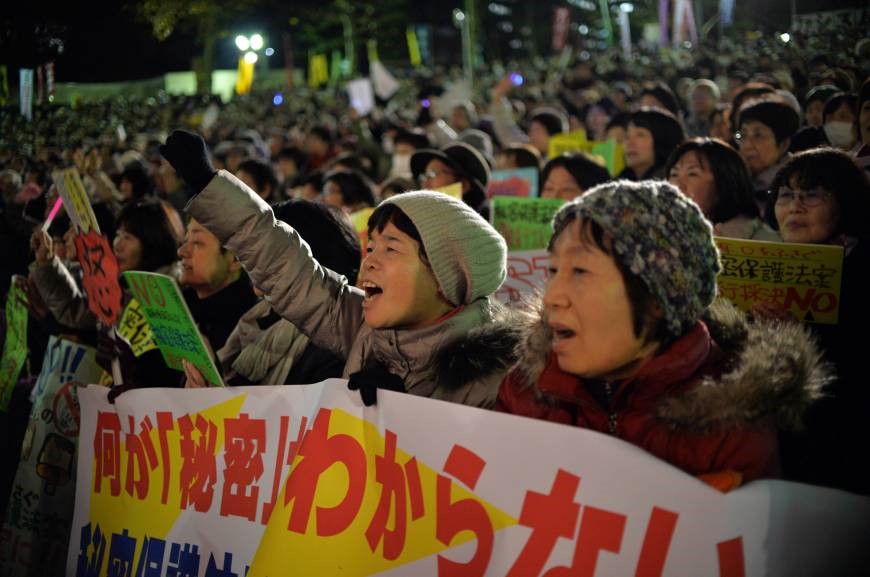Thousands of people took to the streets in Japan’s major cities last week to protest against a controversial new secrecy law that took effect on December 10th, one year after its passage in the Diet. The law, formally called the Act on the Protection of Specially Designated Secrets (SDS), has been hit by heavy criticism in the Japanese press and among members of the opposition over concerns that it will limit access to public information and weaken the media’s ability to cover matters of security and foreign policy.

Against all odds: Protesters voice their opposition against the state secrets bill outside the Diet on Friday night. | AFP-JIJI
Under the law, heads of government ministries and agencies can now designate as state secrets information in the areas of diplomacy, defense, and counter terrorism. In addition, the initial five-year-designation period for a state secret can be extended for up to 30 years, but with cabinet approval state secrets can remain classified for a maximum of 60 years.
Those who leak information designated as state secrets can face up to 10 years in prison and anyone who solicits information using “grossly inappropriate means” could face up to 5 years in prison. There is little doubt that this clause applies specifically journalists and the vague wording could allow the government to apply the sentences arbitrarily.
A means to a political end for the government
The SDS law is perhaps surprising to many given Japan’s many decades as a progressive democratic society with an open, diverse and dynamic media. But the new law also comes at a time when Prime Minister Shinzo Abe and his cabinet are pushing a more assertive defense and foreign policy posture, a contentious departure from the country’s post-war pacifist constitution.
In fact, the law was one of the first to be approved by the prime minister’s new National Security Council, a body meant to centralize decision-making on national security issues. Given the heated national debate over foreign affairs and national defense issues in Japan, the SDS law could allow the government to insulate itself from the critical eye of the press.
Media already feeling the heat from the LDP?
Some are concerned that the law could be used to influence content in Japanese media—and the signs are already there. Prior to Sunday’s parliamentary elections, the ruling Liberal Democratic Party (LDP) sent a letter to Japan’s five biggest broadcasters to demand “neutral” reporting on the election, an unusual move in the country.
The LDP ultimately enjoyed a strong election showing, with it and its junior coalition partner maintaining a super majority in the powerful lower house of the Diet. Although low turnout figures point to growing dissatisfaction with Abe’s government, has a renewed mandate to continue its current course, and this could spell trouble for the Japanese media.

Comments (0)